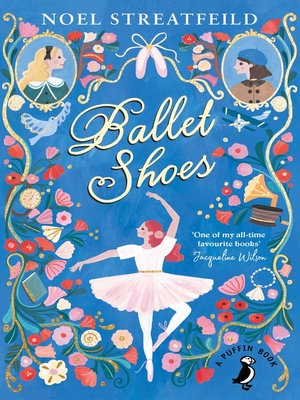So, here we are, officially at no.75, a quarter of the way through this journey! I've been pretty motivated since January to read and write more, so hopefully I can keep this pace up and read and share lots of fab books this year!
Today I want to talk to you about Noel Streatfeild's classic story Ballet Shoes, published in 1936. Last year I watched the most lovely adaptation of the story on the tele, starring Emma Watson, Emelia Fox and Victoria Wood, amongst others. The film was beautiful, and the story enchanting, with the screenplay written by Heidi Thomas, who writes Call the Midwife, and recently adapted Little Women for the BBC. So having enjoyed this so much, I was excited to read Ballet Shoes. For those of you who don't know the story it is all about the Fossil sisters, Pauline, Petrova and Posy. They are each found and adopted as babies by the eccentric explorer and fossil collector Gum, who sends them back to England to live with his niece and her nanny in London. It soon becomes apparent that Gum is not coming home for a very long time, even presumed missing at one point, and so Sylvia and Nana are left to bring up the three girls themselves. Money is tight and it is suggested that the girls get training in something that will help them make a living when they are older, so they start attending The Children's Academy of Dancing and Acting. Streatfeild, who trained at RADA, knew a thing or two about the theatre, and it is very apparent that she is comfortable writing about this world.
The plot is slightly different to the adaptation I was familiar with, but the characters were certainly the same. Nana is fussy and a stickler for sensibleness, routine and order in her Nurseries. Sylvia, known to the girls as Garnie, a portmanteau of Guardian and Auntie, is a timid, sad lady, who only wants the best for her girls, and despairs when she cannot provide for them. Pauline, the eldest of the Fossil sisters was found at sea after a shipwreck. She takes to acting and loves to perform, in particular recitation. Her talent takes her far, though causes problems at times, especially when she lets it go to her head! Petrova, found in Russia, therefore given a Russian name, is not at all interested in being on the stage. She would much rather fiddle with engines and fly aeroplanes. However, she grits her teeth and gets through performance after performance, so that she can give Garnie some money towards their upkeep. The littlest Fossil, Posy, was abandoned by her dancer mother with a pair of ballet shoes, so is destined to be a ballerina. She is such a good dancer in fact, that she gets private lessons from the Russian ballerina who owns the Academy. She is almost heartless in her absolute need to be the very best, which as it turns out is not a bad thing! Alongside the girl's and their wards, there are some other lovely characters, my favourite being the two lady doctors who take lodgings in Gum's big house. They are not medical doctors, but doctors of literature and mathematics, and so take it upon themselves to educate the girls. There is also the rather glamorous Theo Dane, another boarder, who teaches ballet at the Academy. And finally, lodging with Sylvia and the Fossil's are Mr and Mrs Simpson. In the tele adaptation there was no Mrs Simpson, and Mr Simpson acted as the love interest/father figure. I was quite glad to see that this was not the case in the book. The plot is purely centred around the girls and nothing else.
Cleverly, Streatfeild has written some wonderfully strong female characters in this book. Rather like Louisa May Alcott in Little Women, she has managed to create a tight knit female family unit, each with their own strengths and weaknesses. The only male characters that exist are those in the theatre industry, or at the Council, and of course Mr Simpson and Gum. However, Mr Simpson has quite a stereotypical male role, helping the girls out financially, and teaching Petrova all about cars and planes. And Gum of course is pretty much non-existent for the entire story! In fact he is talked about with distaste by Nana, and considered a bit of a let down! By the end of the book Streatfeild has created three thoroughly independent young ladies, all pursuing their own dreams and their own interests, even Petrova, who ventures where many women at that time had not. The book ends with the question "I wonder... If other girls had to be one of us, which one of us they'd choose to be?" And what a choice for the girl reader; ballerina, actress, or pilot. I know which one i'd choose!
Throughout the book the Fossil sisters vow to get their names in the history books, and not because of something their Grandfathers did, but because of what they achieved themselves. I would say that this is a very appropriate sentiment at the moment, what with the trend in books that aim to encourage girl's to follow their dreams, and empower them with stories of women who have. Streatfeild's girls could quite easily be added to the biographies in these books, as women who raised themselves up from nothing, not even knowing their own parentage, and followed their dreams.
Thanks for reading, L x
Next up, The Velevteen Rabbit


